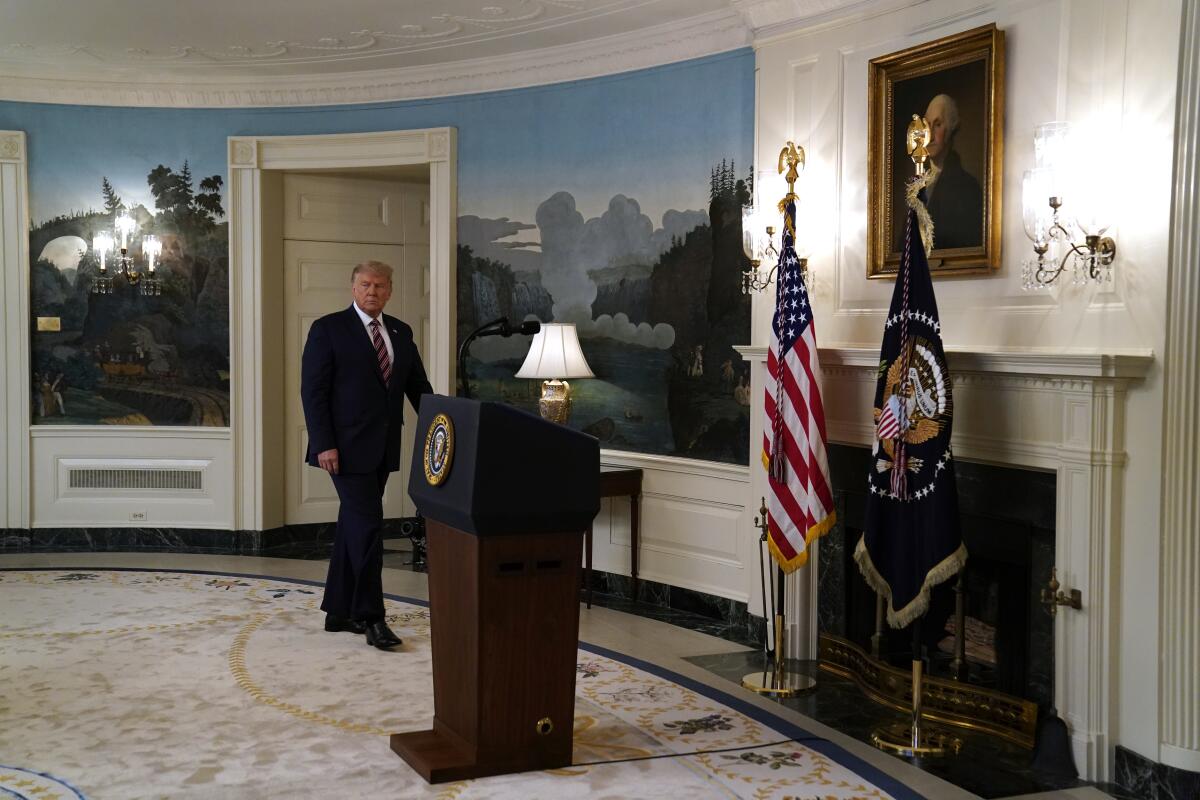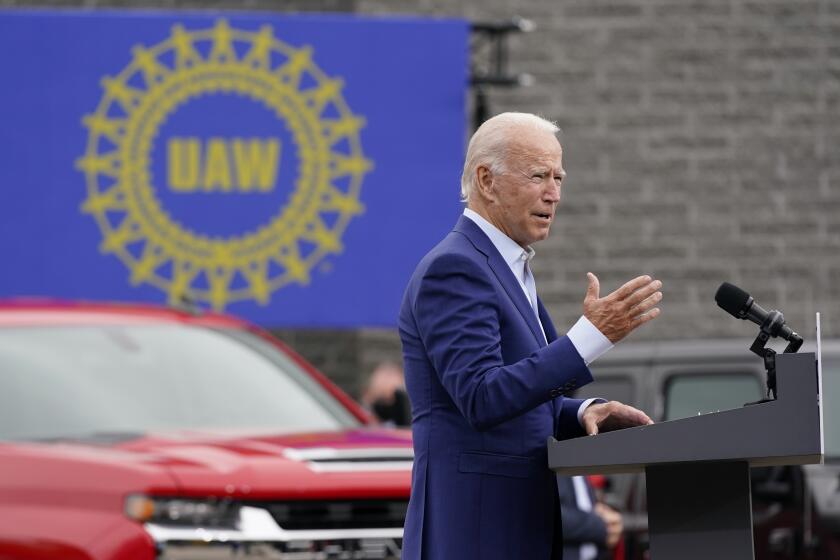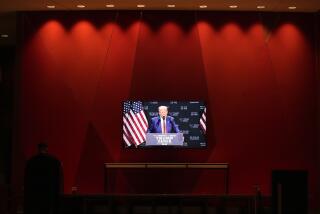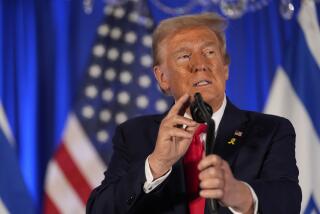Furor erupts over Trump deliberately downplaying the coronavirus

- Share via
WASHINGTON — President Trump said in a taped interview that he deliberately downplayed the danger of the coronavirus in public early this year even though he knew it posed a deadly threat to Americans, a revelation that sent shock waves Wednesday through a presidential campaign entering the homestretch.
The damaging disclosure came in one of 18 recorded interviews that Trump gave to veteran journalist Bob Woodward between December and July for “Rage,” a book scheduled for publication Tuesday. It exploded into public view on a day when the confirmed U.S. death toll from COVID-19 exceeded 190,000, a once-unimaginable tally.
The audio recordings included the president’s admission in February that he knew the coronavirus was “more deadly” than the common flu, even though he was claiming otherwise in public.
Several weeks later, Trump also acknowledged he was downplaying the pandemic on purpose.
Trump critics and experts on authoritarianism see an increasingly bleak future for America if voters don’t come to terms with the president’s behavior.
“I wanted to always play it down,” Trump told Woodward on March 19. “I still like playing it down, because I don’t want to create a panic.”
In their final interview, on July 21, Trump vented to Woodward: “The virus has nothing to do with me. It’s not my fault.”
Former Vice President Joe Biden, the Democratic nominee, denounced Trump’s comments while the White House, unable to dismiss the president’s own words as a news report based on unnamed sources, scrambled to respond.
“It was a life-and-death betrayal of the American people,” Biden said during a campaign appearance with union members in Warren, Mich. “He knowingly and willingly lied about the threat it posed to the country for months.
“He knew how dangerous it was,” Biden continued. “While this deadly disease ripped through our nation, he failed to do his job on purpose.”
Biden cited researchers who contended that tens of thousands of lives might have been saved if the White House had acted more swiftly to lock down offices, factories and schools in March.
After the story broke, Trump defended his misleading messaging on the pandemic as evidence of leadership, suggesting that conveying strength and resolve was more important than delivering a sobering public health warning.
“We want to show confidence,” Trump told reporters. “We want to show strength. We want to show strength as a nation and that’s what I’ve done.”
He added, “You cannot show a sense of panic or you’re going to have bigger problems than you had before.”
Trump’s refusal to warn Americans about COVID-19 went beyond his public comments. In the month after telling Woodward he understood the danger of exposure to the coronavirus, he held five campaign rallies, putting tens of thousands of people at potential risk.
Woodward’s audio tapes with Trump are certain to be featured in Democratic campaign ads, but they may not change the trajectory of the fall campaign. Trump won in 2016 weeks after a video revealed his off-screen comments on “Access Hollywood” bragging that his celebrity enabled him to assault women.
Four years ago, victories in Pennsylvania, Michigan and Wisconsin put Trump in the White House. The three states are once again at center stage.
For most voters, Trump’s coarse, blunt and often incendiary rhetoric and behavior are already baked into their assessments of a highly unconventional and controversial president.
But with just 54 days left in a contest that has tightened in some battleground states as Trump has fought to reframe the race around issues of crime and safety, the revelation immediately shifted the focus back to Biden’s preferred battleground, the president’s response to the deadly pandemic.
The impact may be heightened at a moment when millions of families, already locked down or severely constrained since March, have been forced to begin a new school year in virtual form from their homes. Moreover, the economy continues to struggle: Although unemployment has declined, more than 13.6 million Americans are out of work.
At the White House, Press Secretary Kayleigh McEnany argued that Trump’s recorded comments were consistent with his public statements from the time, saying he sought to keep the country calm and did not intentionally withhold dire warnings that might have prompted the public to take more adequate precautions.
“The president has never lied to the American public on COVID,” McEnany said. “The president was expressing calm and his actions reflect that.”
McEnany flatly denied that Trump did what he can be heard admitting to Woodward that he was doing: “The president never downplayed the virus,” she said. “At a time when you’re facing insurmountable challenges, it’s important to express confidence, it’s important to express calm.”
Sen. Lindsey Graham (R-S.C.) was one of the few Republican lawmakers to discuss the audio tapes, arguing that Trump’s actions, more than his comments, showed the country he was taking the virus seriously.
“I don’t think he needs to go on TV and scream, ‘We’re all going to die,‘” Graham said. “But his actions of shutting the economy down were the right actions. I think the tone at the time sort of spoke for itself. People knew it was serious.”
Democrats were less charitable.
“He didn’t know how to cope with a challenge to our country,” House Speaker Nancy Pelosi (D-San Francisco) told MSNBC. “Secondly, his disdain and denial for science, which has the answers. We could have contained this early on. But, bigger than all of that, bigger than all of that was his total disregard for the impact on individual families in our country.”
The Woodward book also includes stinging criticisms of Trump from current and former officials who worked closely with him.
According to excerpts in the Washington Post, former Defense Secretary James N. Mattis called Trump “dangerous” and “unfit.” At one point, Mattis spoke with Dan Coats, then the director of national intelligence, about whether they should take “collective action” and speak out publicly against Trump, who Coats said “doesn’t know the difference between the truth and a lie.”
Dr. Anthony Fauci, a key figure on the White House coronavirus task force whose warnings have frustrated the president, reportedly grumbled to Woodward about Trump’s attention span being “like a minus number.”
Woodward also includes an anecdote about Trump lambasting the nation’s top military officials in a meeting, saying: “My fucking generals are a bunch of pussies” who care more about military alliances than trade deals.
Times staff writer Jennifer Haberkorn contributed to this report.
More to Read
Get the L.A. Times Politics newsletter
Deeply reported insights into legislation, politics and policy from Sacramento, Washington and beyond. In your inbox three times per week.
You may occasionally receive promotional content from the Los Angeles Times.














